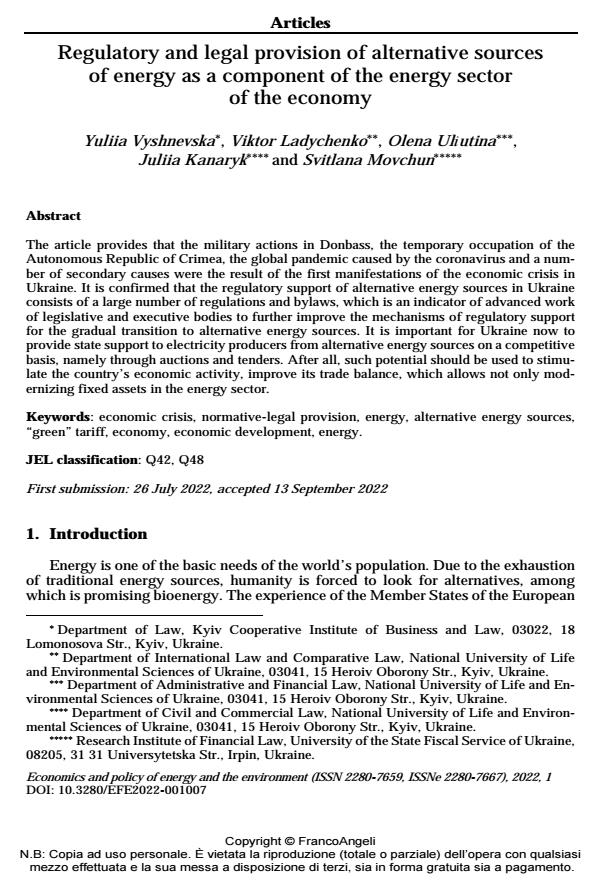Regulatory and legal provision of alternative sources of energy as a component of the energy sector of the economy
Journal title ECONOMICS AND POLICY OF ENERGY AND THE ENVIRONMENT
Author/s Yuliia Vyshnevska, Viktor Ladychenko, Olena Uliutina, Juliia Kanaryk, Svitlana Movchun
Publishing Year 2022 Issue 2022/1
Language English Pages 12 P. 119-130 File size 128 KB
DOI 10.3280/EFE2022-001007
DOI is like a bar code for intellectual property: to have more infomation
click here
Below, you can see the article first page
If you want to buy this article in PDF format, you can do it, following the instructions to buy download credits

FrancoAngeli is member of Publishers International Linking Association, Inc (PILA), a not-for-profit association which run the CrossRef service enabling links to and from online scholarly content.
The article provides that the military actions in Donbass, the temporary occupation of the Autonomous Republic of Crimea, the global pandemic caused by the coronavirus and a num- ber of secondary causes were the result of the first manifestations of the economic crisis in Ukraine. It is confirmed that the regulatory support of alternative energy sources in Ukraine consists of a large number of regulations and bylaws, which is an indicator of advanced work of legislative and executive bodies to further improve the mechanisms of regulatory support for the gradual transition to alternative energy sources. It is important for Ukraine now to provide state support to electricity producers from alternative energy sources on a competitive basis, namely through auctions and tenders. After all, such potential should be used to stimu- late the country’s economic activity, improve its trade balance, which allows not only mod- ernizing fixed assets in the energy sector.
Keywords: economic crisis, normative-legal provision, energy, alternative energy sources, "green" tariff, economy, economic development, energy.
Jel codes: Q42, Q48
- Legal foundations of stimulating fiscal policy in the EU Anton Monaienko, Nataliia Atamanchuk, Oksana Soldatenko, Valentyna Vlasenko, Galyna Striiashko, in Social Legal Studios /2024 pp.56
DOI: 10.32518/sals1.2024.65
Yuliia Vyshnevska, Viktor Ladychenko, Olena Uliutina, Juliia Kanaryk, Svitlana Movchun, Regulatory and legal provision of alternative sources of energy as a component of the energy sector of the economy in "ECONOMICS AND POLICY OF ENERGY AND THE ENVIRONMENT" 1/2022, pp 119-130, DOI: 10.3280/EFE2022-001007